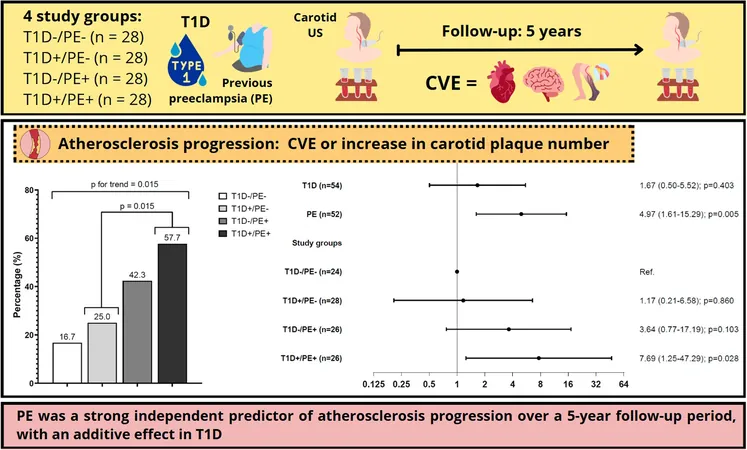
Shocking Link: Preeclampsia Doubles Atherosclerosis Risk in Women with Type 1 Diabetes!
2025-04-09
Author: Ming
Preeclampsia and Diabetes: A Dangerous Connection?
In a groundbreaking 5-year study, researchers have discovered that women with type 1 diabetes (T1D) who suffered from preeclampsia during pregnancy face a significantly heightened risk of atherosclerosis progression. The implications of this study are shocking, as it reveals that preeclampsia may act as an independent predictor of heart disease in this vulnerable group.
What This Study Reveals
The study involved 112 women, all diagnosed with T1D. They were categorized into four groups based on their pregnancy history: those with T1D and a history of preeclampsia, those with T1D without preeclampsia, women with preeclampsia but no diabetes, and a control group with neither condition. The aim? To assess cardiovascular risk and atherosclerosis over time.
Staggering Findings on Atherosclerosis Progression
The results were alarming: 43.3% of participants displayed signs of atherosclerosis during the follow-up, with those having both T1D and preeclampsia experiencing a staggering 57.7% prevalence. This is a concerning trend when compared to the 20.8% prevalence found in those without either condition.
The Risk Factors at Play
Participants with a history of preeclampsia not only had higher rates of atherosclerosis but also exhibited elevated blood pressure and diabetes duration compared to their peers. The study found that preeclampsia remained a potent risk factor even after considering other critical variables like age, body mass index, and blood pressure.
Why Does Preeclampsia Matter?
The study suggests that the inflammatory effects linked to preeclampsia may persist long after pregnancy, leading to long-term vascular issues and metabolic dysregulation. This connection highlights the urgent need to reevaluate cardiovascular risk assessment, especially in women who have had preeclampsia.
Potential Implications for Healthcare
These findings could change how healthcare providers manage cardiovascular risk in women with T1D. Integrating preeclampsia history into cardiovascular risk evaluations could dramatically improve early interventions, potentially saving lives. Despite the general decline in cardiovascular disease rates, young women continue to face rising risks, which amplifies the necessity for tailored therapeutic strategies.
A Call for More Research!
This pioneering study uncovers a critical link between preeclampsia and long-term cardiovascular risk in women with type 1 diabetes. Further research is essential to explore this relationship and develop targeted interventions that could drastically reduce heart disease rates in this high-risk population. Remember: understanding these connections is vital for future health advancements for women everywhere.



 Brasil (PT)
Brasil (PT)
 Canada (EN)
Canada (EN)
 Chile (ES)
Chile (ES)
 Česko (CS)
Česko (CS)
 대한민국 (KO)
대한민국 (KO)
 España (ES)
España (ES)
 France (FR)
France (FR)
 Hong Kong (EN)
Hong Kong (EN)
 Italia (IT)
Italia (IT)
 日本 (JA)
日本 (JA)
 Magyarország (HU)
Magyarország (HU)
 Norge (NO)
Norge (NO)
 Polska (PL)
Polska (PL)
 Schweiz (DE)
Schweiz (DE)
 Singapore (EN)
Singapore (EN)
 Sverige (SV)
Sverige (SV)
 Suomi (FI)
Suomi (FI)
 Türkiye (TR)
Türkiye (TR)
 الإمارات العربية المتحدة (AR)
الإمارات العربية المتحدة (AR)